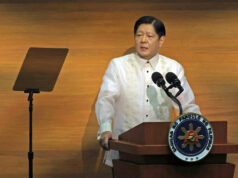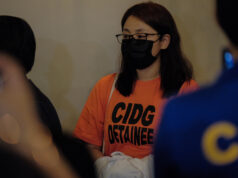Duterte defends police order against loiterers
By Camille A. Aguinaldo
President Rodrigo R. Duterte on Friday, June 22, said critics may challenge his recent crackdown order against “tambays” or loiterers before the Supreme Court.
In his speech during the National Information and Communications Technology (ICT) Summit in Davao City, the President invoked the “parens patriae” doctrine to justify his directives to the Philippine National Police (PNP) to impose stricter measures against loiterers.
“If you are a minor, under the power of parens patriae, you are the father of the nation, you can always give an advice for people, such as minors,” he said.
“That’s why I said, ‘if you are unruly, I will really ask you to go home or else you will be arrested.’ That is the police power of the state. Let them contest it in the Supreme Court,” he added.
He also clarified that he never ordered the PNP to arrest loiterers. In a speech last June 13, the President asked the newly promoted law enforcers to be strict against loiterers and to bring them to Malacañang if they refused to go home.
“So my directive is tell loiterers ‘go home. If you don’t go home, bring them to the office of– Pasig. I’ll take care of it. Put it there. I will tie their hands as well– I will drop them in– You be strict. Part of confronting people who do not do nothing and just idling around, they are potential trouble for the public,” he said in his June 13 speech.
According to Cornell Law School’s Legal Information Institute, “parens patriae,” which is Latin for “parent of his or her country,” refers to the power of the state to act as guardian for those who are unable to care for themselves, such as children or persons with disability.
Mr. Duterte drew flak from politicians and human rights group following his “anti-tambay operations” order. Critics raised concerns over the order, pointing out the possibility that it may lead to abuses.
Also on Friday, Malacañang defended anew the President’s order, allaying criticisms that the crackdown against loiterers was only targeted to the poor.
“It targets all those who violate local ordinances and laws,” presidential spokesperson Harry L. Roque, Jr. said in a text message to reporters.



